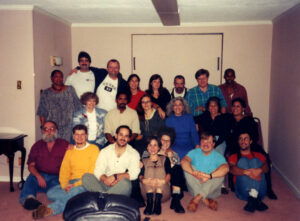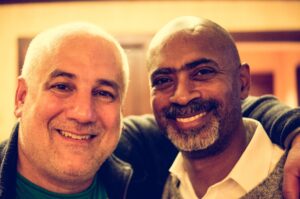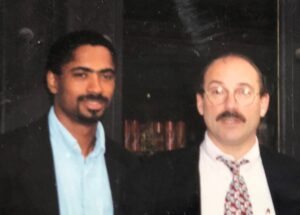In observance of Black History Month, National Harm Reduction Coalition (NHRC) is honored to recognize Dr. Ricky N. Bluthenthal for his ongoing commitment to lifting up the voices and experiences of people who use drugs and his many contributions to the harm reduction movement. For decades, Dr. Bluthenthal has worked in the movement in several capacities, and continues to ensure people who use drugs are at the center of his work.
His journey in the movement has led him to the University of Southern California (USC), where he serves as a professor in the Department of Population and Public Health Sciences (DPPHS), vice chairperson for Diversity, Equity and Inclusion in DPPHS, and associate dean for social justice in the Keck School of Medicine (KSOM) — though his work in harm reduction and health equity began long before holding these titles.

Dr. Ricky Bluthenthal smiles and poses with a harm reduction working group.
Since 1991, he has conducted community-partnered research on risk behaviors and health promotion among people who inject drugs (PWID), men who have sex with men, and other underserved populations. Putting down roots in the movement as a graduate student, Dr. Bluthenthal co-founded the then-groundbreaking syringe exchange program in Oakland, California, and was a founding board member of NHRC. He conducted the first HIV epidemiological on HIV among people who inject drugs in East Palo Alto, Oakland, and Richmond, CA, in the early 1990s. Dr. Bluthenthal was arrested and acquitted for running The HIV Education and Prevention Project of Alameda County (HEPPAC/Casa Segura).
Fast forward to today, and Dr. Bluthenthal continues focusing on the experiences of communities who have been historically marginalized. In addition to his roles at USC, he is conducting an observational epidemiological cohort study on the substitution of cannabis for opioids among PWID, an evaluation of the Hollywood LEAD program for case-managed diversion of populations disproportionately engaged with law enforcement, and qualitative, life histories of opioid use among men in marginalized communities. Understanding the importance of intersectionality, Dr. Bluthenthal’s other research interests include — among many others — the effects of structural racism and violence on community health, interventions to prevent withdrawal symptoms among people who use opioids and stimulants, and the impact of displacement on health and risk among people who use drugs.
Dr. Bluthenthal has led studies funded by the Centers for Disease Control and Prevention (CDC), the National Institute on Drug Abuse, the National Institute on Alcohol Abuse and Alcoholism, the National Institute on Minority Health and Health Disparities, and the Robert Wood Johnson Foundation, among others. He has also served as a standing member on three National Institute of Health (NIH) study sections (Community Influences on Health Behavior [CIHB], Health Disparities and Equity Promotion [HDEP], and Behavioral and Social Science Approaches to Preventing HIV/AIDS [BSPH]) and served as chairperson of HDEP for three years.

Dr. Ricky Bluthenthal, at right, smiles with Dan Bigg, founder of the Chicago Recovery Alliance, at left. Bluthenthal shared, “President Obama has written, ‘Change will not come if we wait for some other person or if we wait for some other time. We are the ones we’ve been waiting for. We are the change that we seek.’ Dan Bigg embodied this truth for the harm reduction movement more than anyone I know or have ever met.”
In addition to the many studies Dr. Bluthenthal has led, he has published over 180 manuscripts in peer-reviewed scientific journals, and his studies have appeared in leading medical, public health, and addiction journals including The Lancet, JAMA, and American Journal of Public Health. Dr. Bluthenthal’s passion for this work also extends to serving on the editorial boards of the International Journal of Drug Policy and Drug and Alcohol Dependence, and he is an associate editor of the addiction section for Annals of Medicine.
As associate dean for social justice in KSOM, Dr. Bluthenthal is widely esteemed for his leadership role in designing and implementing an innovative and robust portfolio of programs and resources that engage faculty, staff, and students as learners and stakeholders in KSOM’s capacity to lead on issues of diversity and equity. His office organizes a highly curated, well-attended program of readings, speakers, discussion groups, and trainings on topics related to structural racism, anti-racism education, and “allyship.” At KSOM, Dr. Bluthenthal also serves as the chairperson of the dean-sponsored “Justice through Equity, Diversity, Inclusion, Well-being and Social Transformation” initiative, a $2 million effort to engage associate deans and program directors as proactive strategists and advocates for community engagement, diversity, equity, inclusion, wellness, and gender equity.

Dr. Ricky Bluthenthal, left, stands with John K. Watters, his mentor, who died from an overdose and wrote one of the first papers on the effectiveness of syringe services programs (SSPs).
In 2018, Dr. Bluthenthal was the recipient of the Imani Woods Harm Reduction Visionary Award from NHRC. A dedicated champion of community-engaged volunteerism, Dr. Bluthenthal proudly serves on the boards of and is an advisor to several nonprofit organizations including the Council on Black Health, Unity Recovery (Philadelphia, PA), and the LA Community Health Outreach Project.
We are forever grateful for Dr. Bluthenthal and his tireless work with and for the community.
Learn more about Dr. Bluthenthal’s seminal research on harm reduction topics:
Bluthenthal RN. Syringe exchange as a social movement: A case study of harm reduction in Oakland, California. Substance Use & Misuse. 1998;33(5):1146-1171.
Bluthenthal RN, Lorvick J, Kral AH, Erringer EA, Kahn JG. Collateral damage in the War on Drugs: HIV risk behaviors among injection drug users. The International Journal of Drug Policy. 1999;10:25-38.
Bluthenthal RN, Anderson R, Flynn NM, Kral AH. Higher syringe coverage is associated with lower odds of HIV risk and does not increase unsafe syringe disposal among syringe exchange program clients. Drug and Alcohol Dependence. 2007; 89(2-3):214-22. PMCID:PMC2562866.
Chiang JCY, Bluthenthal RN**, Wenger L, Auersweld CL, Henwood BF, Kral AH. Health risk associated with residential relocation among people who inject drugs in Los Angeles and San Francisco, CA: A cross-sectional study. BMC Public Health. 2022; 22(1):823.
https://bmcpublichealth.biomedcentral.com/articles/10.1186/s12889-022-13227-4
